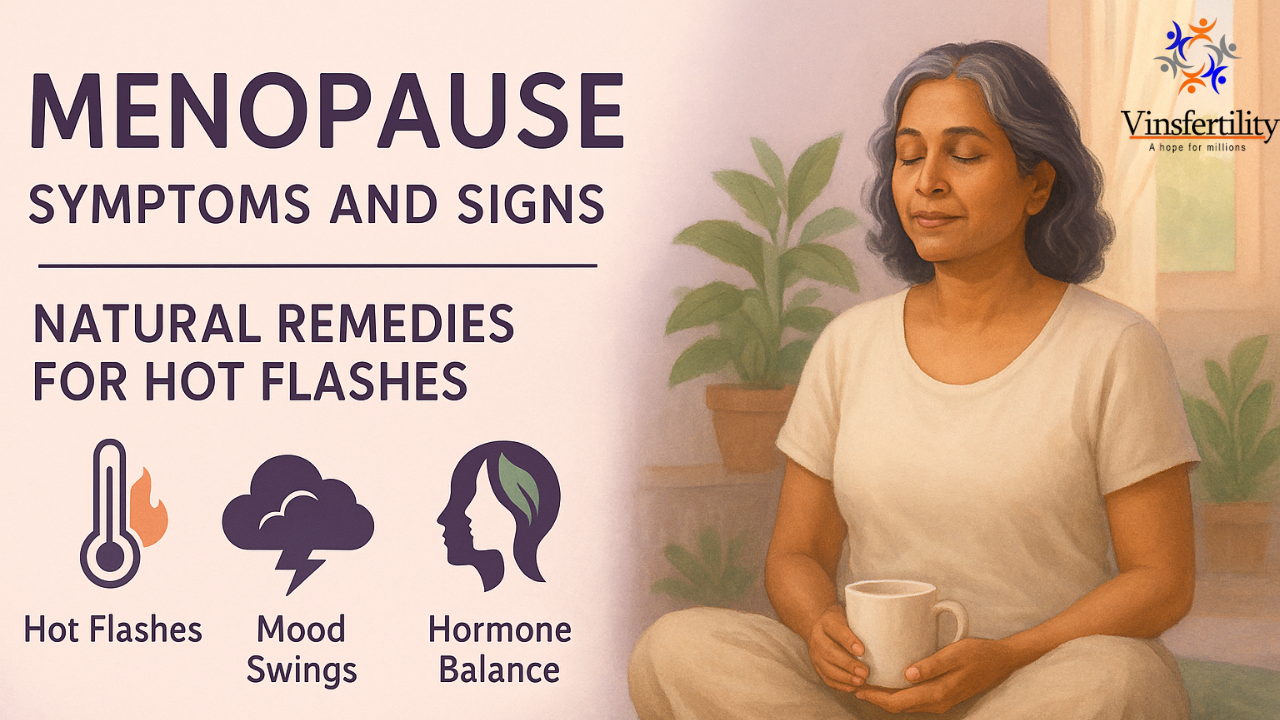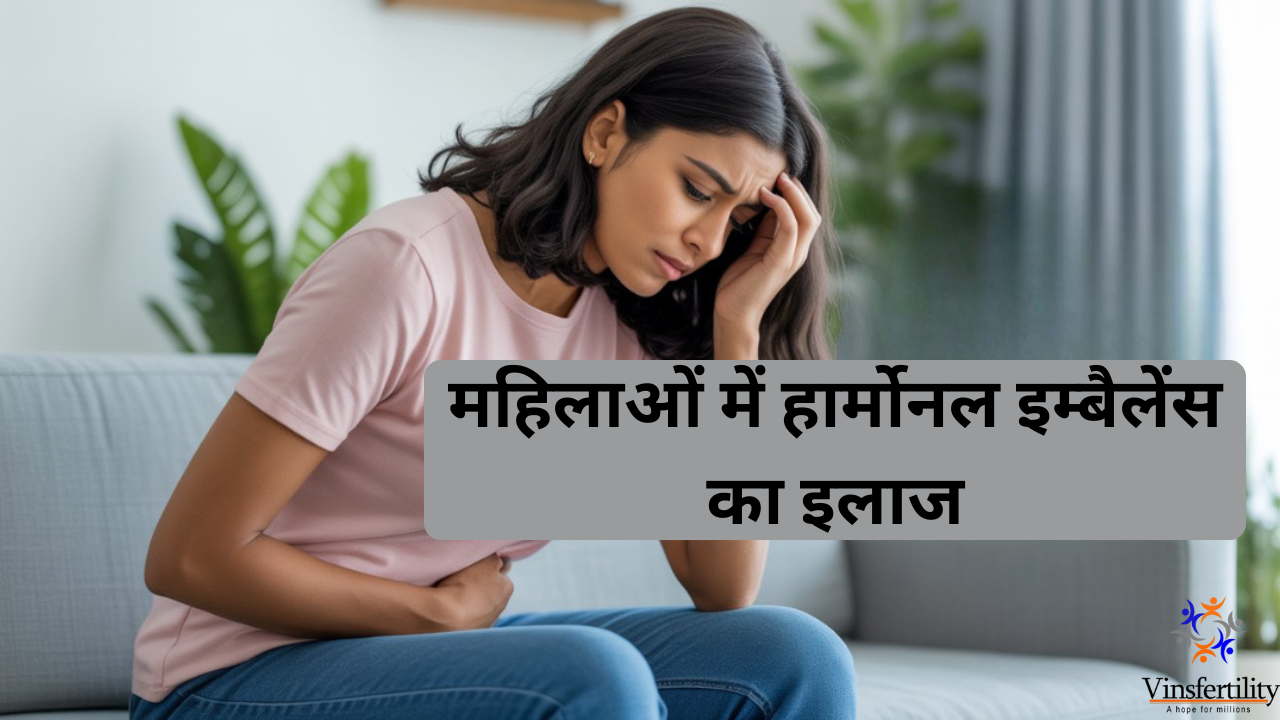
Menopause | Symptoms and Signs | Natural Remedies for Hot Flashes
Menopause is a normal process in a life of a woman. It implies that the body is gradually ceasing to get its monthly periods as menstruation and going out of reproducing years means natural cessation of reproductive age. This normally occurs at age 45 to 55. At this period, hormonal levels in a woman begin to fluctuate including estrogen and progesterone which may cause many changes on the body.
However, this is normal. You will be able to deal with this stage easier by looking into what is going on and taking care of yourself. Menopause is experienced in most women with better feeling and confidence because of the support and lifestyle.
Struggling with menopause-related infertility? Early menopause can make natural conception difficult, but options like IVF and surrogacy offer new hope. Explore our affordable Surrogacy Cost in India and all-inclusive Surrogacy Cost in Bangalore to find the right path forward.
What is Menopause?
Menopause is the inherent biological phenomenon in case the female has not been having her periods 12 months consecutively. This implies that the menstrual period has naturally ceased in her body and she is able to conceive no more indicating permanent infertility. There is nothing wrong, nothing is a disease but it is a stage of life. Menopause also comes because there is a progressive diminishment in the operation of the ovaries promoting the production of the reproductory type of hormones such as estrogens and progesterones. In India the mean age of menopause is about 46-47 years slightly younger as compared to an average of the whole world which is 51 years.
The 3 Stages of Menopause
Understanding the different stages of menopause can help women understand their body better and manage symptoms effectively
1. Perimenopause (Before Menopause)
This transitional phase can begin 8 to 10 years before actual menopause, usually in your 40s.
During perimenopause symptoms like :
-
Irregular periods
-
Hot flashes
-
Mood swings or irritability
These changes happen because of hormonal changes during this time.
2. Menopause
This is the point when periods stop permanently, this means no periods for 12 straight months. This marks the start of menopause.
3. Post-menopause (After Menopause)
This is the time after menopause. , during which menopausal symptoms like hot flashes, continue but they usually become less severe over time.
|
Stage |
Duration |
Key Characteristics |
Average Age Range |
|
Perimenopause |
2-10 years |
Irregular periods, hormone fluctuations |
40-50 years |
|
Menopause |
12 months |
No menstrual periods |
45-55 years |
|
Post-menopause |
Remainder of life |
Stable low hormone levels |
55+ years |
Common Signs and Symptoms of Menopause
Physical Symptoms of Menopause
Each female is different in her menopause but there are some general physical symptoms that most women undergo:-
Hot Flashes and Night Sweats: About three quarter of all women who experience menopause suddenly experience the feeling of heat (hot flashes) which may extend up to several seconds to a few minutes. These can be accompanied with sweating, rapid pulse and even anxiety. It may also occur at night during sleeping time when one is disturbed by hot flashes disturbing their normal activities.
-
Irregular Periods: Periods at this stage can become irregular in terms of time, volume, and length as a result of the fluctuation of the hormones during perimenopause. There are those women who will bleed more than others will during their periods.
-
Sleep Disturbed: The changes of hormones can have a very adverse effect on sleep and it may affect the individual to experience insomnia, frequent waking, and inability to sleep.
-
Increase in the weight: This is encountered by many women and usually in the region of the belly. This occurs due to low metabolism rates and lowered body hormones.
Emotional and Mental Changes
The transition entitled as menopause leads to the decline of emotional and mental health along with physical one:-
Mood Swings: Sudden mood swings may also occur just like in case of PMS due to changes in hormones. Women can be more irritable, anxious or even a little bit down without any apparent cause.
-
Memory and Concentration Problems: Most commonly referred to as brain fog, numerous women complain of the inability to concentrate and focus, memory gaps and mental exhaustion during menopause.
-
Losing Sex Drive: A decrease in sex drive is also a repercussion of reduced levels of estrogen, and there is risk of developing the vagina going dry making sexual activities uncomfortable.
Natural Remedies for Hot Flashes
Dietary Approaches
Diet is also an important way of controlling the menopausal symptoms without drugs, The following are foods that can alleviate hot flashes and maintain hormonal balance:
-
Foods High in Phytoestrogen: Such foods as soybean or tofu products, flaxseeds or lentils include plant- based compounds known as phytoestrogen. It is one way of naturally balancing the hormones and reducing hot flashes.
Research indicates that the intake of 50-100 mg of soy isoflavone per day reduce hot flashes by up to 45%. -
Cooling Foods: Cucumber, watermelon and mint are natural refrigerating foods, which can assist with temperature control in hot flashes.
-
Omega- 3 Fatty Acids: Omega- 3s can be found in fish (such as salmon), walnuts and chia seeds and help decrease inflammation and improve male hormone balance.
Herbal Remedies
A number of herbs have been found to be effective in the treatment of menopausal symptoms, these are:
-
Black Cohosh: Reduction of hot flashes and night sweats is achieved by using this herb. Circulatory chances of the hot flashes also shrank dramatically according to clinical studies that reveals that the most appropriate divisions of the hot flashes perpetuate satisfactorily with any amount of 40-80mg of daily dosages.
-
Evening Primrose Oil: It contains high amounts of gamma-linolenic acid (GLA) and can possibly be useful to treat mood swings and hot flashes. It is normally used as a supplement.
-
Red Clover: This plant contains isoflavones (found in soy) and it is possible that it can be useful in relieving hot flashes, and in preserving bone strength post-menopause.
Lifestyle Modifications to Manage Menopause Naturally
Menopause can bring a lot of changes, but simple lifestyle habits can make a big difference.
Physical activity and exercise
-
Frequent physical activity can lower the number of hot flashes, make a person feel in a good mood, and sleep better. Thirty minutes of walking, swimming or cycling a day contributes heart health.
-
The light weight training maintains your bones and muscles powerful.
-
Yoga or Tai Chi will alleviate stress and will enable you to sleep well.
Stress Management Techniques
Menopause symptoms are aggravated by stress, hence take breaks and relax.
-
Mindfulness and meditation can also help in the reduction of anxiety, sleep and also control of hot flashes.
-
During hot flashing, one can immediately be assisted by juicing techniques of deep breathing
-
Good sleep habits Sticking to regular sleeping times and making the bedroom cool and comfortable.
Medical Treatment for Menopause Symptoms
When lifestyle changes aren’t enough, medical treatments can help manage menopause symptoms more effectively.
Hormonal Therapy Replacement (HRT)
HRT replaces the hormones that your body no longer produces during the period of menopause, notably the estrogen, through hormone replacement.
- Estrogen Therapy: In pill, patch, gel or rings. It assists in curbing hot flash, night sweats and vaginal itching.
-
CombinedTherapy (Estrogen + Progesterone): This is advised among women having intact uteruses. A combination of estrogen andprogesterone gives better protection and balance.
-
Bioidentical Hormones: They are manmade hormones identical to the hormones produced by your body, chemically.
Alternative medical treatments
Other medicine These other options will also work in case hormone therapy is not apt:
-
Selective Serotonin Reuptake Inhibitors (SSRIs): Low doses of antidepressants have been shown to successfully cut down hot flashes and symptoms of mood.
-
Gabapentin: Gabapentin was originally used with seizures, but it is also useful with night sweats and hot flashes.
-
Clonidine: A blood pressure drug which can be used to treat hot flashes in few women.
Long-term Health impact after menopause
Bone Health
The postmenopausal low level of estrogens may weaken your bones and put them at risk of osteoporosis. Actually, women are inclined to lose a huge portion of their bone strength by 20 percent within the first 57 years of their menopause.
Prevention measures are:
-
Sufficient calcium content (1,200mg on a daily basis)
-
Supplementation of vitamin D (800 1 1000 IU per day)
-
Weight-bearing exercise on a regular basis
Cardiovascular Health
The levels of estrogen reduce, which makes heart diseases risky.
Preventive control:
-
Regular Cardiovascular exercises
-
Keeping good cholesterol levels
-
Heart-healthy food with omega-3 fatty acids
Mental Health Support
The mental aspect of menopause may be quite important because depression becomes a potential event related to the transition in 23 percent of the women.
There are support strategies:
-
Frequent therapy or counseling
-
Support groups
-
Managing of stress
-
Proper sleeping and dietetic medicine
Source:
https://pmc.ncbi.nlm.nih.gov/articles/PMC3952411/
https://www.sciencedirect.com/science/article/pii/S0092867423009054
Conclusion
To live in menopause one needs to have knowledge, planning and sometimes expert assistance. Though this life transition is a difficult process, it can be one of the new health concentration and personal growth. The symptoms of perimenopause coupled with symptoms of menopause do not have to characterize this life stage in a negative way when one has the knowledge and understands how to deal with it.
Frequently Asked Questions (FAQ)
Q1: At what age does menopause typically begin?
Menopause normally develops at the age of 45-55 years with the world average inset at 51 years. In India however, it is moderate between 46-47 years old. Such elements as genetics, smoking and health in general can also make a difference in terms of timing.
Q2: How long do hot flashes last?
Hot flashes range in terms of length between a few seconds to a number of minutes and they happen numerous times a day. The time of hot flash experiences at different women is highly different, switching between several months and more than 10 years, also is averagely 4-5 years.
Q3: Can perimenopause symptoms be treated naturally?
Yes, it is possible to alleviate a great range of symptoms related to perimenopause with the aid of natural treatments comprising the changes in diet, the use of herbs, active exercising, management of stress, lifestyle changes. Nevertheless, at times, the symptoms are so severe that medical assistance is required.
Q4: Is hormone replacement therapy safe for everyone?
Not every woman is a suitable candidate of HRT. Individuals having a record of breast cancer, blood clot, stroke, and some liver infections may not be eligible. It is imperative to have a detailed review with a qualified medical practitioner.
Q5: What are the early signs of perimenopause?
The symptoms most often encountered when it is in its early stages include irregular menstruation, alterations in the menstrual flow, hot flashes, disturbed sleeping, moodiness, low sexual desire, and concentration problems. These symptoms may commence 8-10 years before menopause takes place.
Q6: How can I manage weight gain during menopause?
Exercise, especially strength training, a balanced diet sufficient in protein intake, reducing stress as much as possible, having a good sleep, and dehydration are the ways in which menopausal weight gain can be addressed. Personal strategies can be built with the help of professional guidance.
Q7: Are there any foods to avoid during menopause?
One should also avoid spicy foods, caffeine, alcohol and refined sugars because these may cause hot flashes and aggravate the symptoms. Here, emphasize on whole foods, lean proteins, fruits, vegetables and calcium foods.
Q8: When should I seek medical help for menopausal symptoms?
You should visit a doctor when the symptoms have a serious effect on the quality of your life, when you have severe depression or anxiety, when there are abnormal bleeding patterns, or when natural therapies are not enough. Exercises, early intervention and treatment can help avoid complications and better outcomes.




.png)

.png)